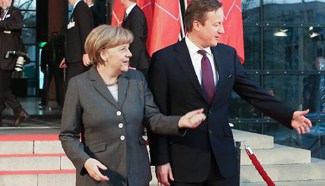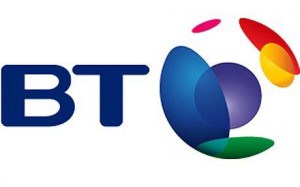
Chancellor Angela Merkel and Prime Minister David Cameron
The slow pace of rolling out superfast broadband across the United Kingdom did not escape the notice of German Chancellor Angela Merkel, who stung Prime Minister David Cameron with a joke comparing the two countries’ progress to provide Internet access to every home.
While traveling to Hanover to visit the CeBIT trade fair, Carmeron sought to promote Great Britain’s economic relationship with Germany. But Merkel wanted to know when Britain would finally complete the rollout of high-speed Internet access to every house in the country.
Cameron’s government has faced criticism over its decision to roll out an advanced form of DSL using fiber to the neighborhood technology similar to AT&T U-verse. Some critics accuse the government of allowing BT and other vendors to overspend public resources on a network that some fear will not prove fast enough to compete in the long-term.
Cameron told Merkel the government had earmarked hundreds of millions of pounds on the project. In response, Merkel dryly replied that Germany’s network would successfully reach every citizen in Germany by 2018.
 UK Communications Minister Ed Vaizey has also faced criticism from communities learning they are not on the upgrade list as well as those promised improved service but still waiting to receive it. Vaizey repeated his claim that 95 percent of the United Kingdom would have faster Internet access by 2017. The British regulatory agency Ofcom’s statistics show the government has a long way to go, with only 73 per cent of the country able to get access to high-speed broadband as of this month.
UK Communications Minister Ed Vaizey has also faced criticism from communities learning they are not on the upgrade list as well as those promised improved service but still waiting to receive it. Vaizey repeated his claim that 95 percent of the United Kingdom would have faster Internet access by 2017. The British regulatory agency Ofcom’s statistics show the government has a long way to go, with only 73 per cent of the country able to get access to high-speed broadband as of this month.
While in Hanover, Cameron suggested the world was nearing a new industrial revolution dependent on a speedy Internet. Cameron noted the future includes “The Internet of Things,” where technology would enable devices of all kinds to interact over wireless networks. Robust broadband infrastructure was therefore essential to the economies of both countries.
As part of that effort, the two leaders announced a joint effort between British and German universities to develop the next generation of Wi-Fi dubbed “5G” that would be fast enough to download a typical movie in less than one second.
[flv]http://www.phillipdampier.com/video/UK Superfast Broadband 2014.flv[/flv]
Although BT likes to advertise “superfast broadband” as coming from a fiber network, in fact most homes will receive an advanced form of DSL service delivered over a hybrid fiber-copper network. (2:38)


 Subscribe
Subscribe